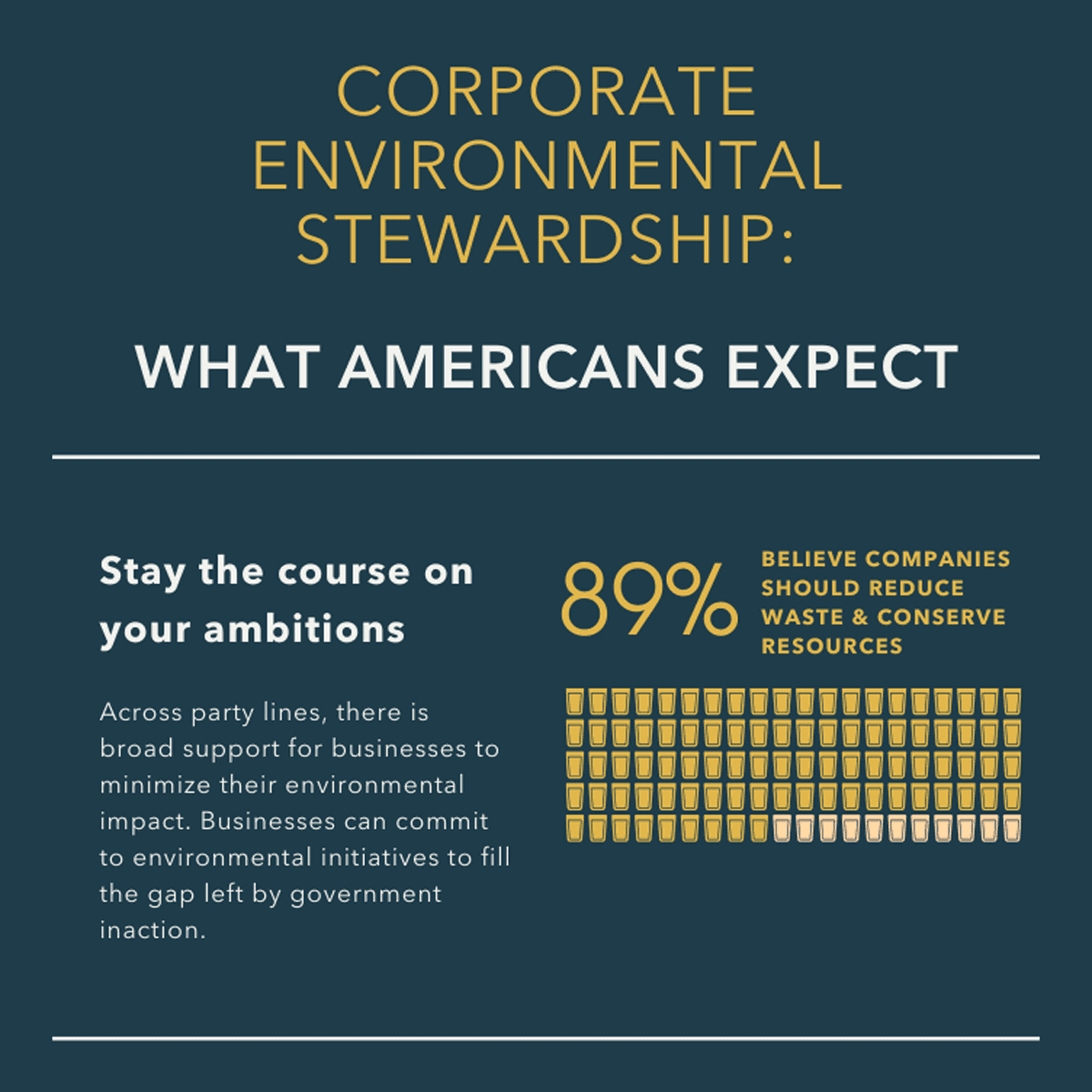
How to Be an Environmental Steward in Today’s Shifting Policy Landscape
April 9, 2025
Companies today are in a tenuous moment with environmental stewardship as political shifts, regulatory uncertainty and questions around investments remain unclear. With significant changes underway in the federal approach to environmental policy, businesses are weighing how to position their sustainability initiatives in this evolving context.
APCO’s latest Pulse Check survey, which captures public sentiment on corporate action during the period of presidential transition, reveals a compelling picture: despite the politically charged atmosphere, Americans across the political spectrum are concerned about changes to the environment and continue to support corporate environmental stewardship. The findings highlight a notable consensus that transcends partisan divides, offering valuable insights for businesses navigating this complex terrain.
Despite these findings, businesses may still be uncertain about the actions they should take and whether they need to adjust their commitments. Our research highlights the importance of maintaining consistent environmental commitments, aligning sustainability efforts with stakeholders’ daily concerns and leveraging business coalitions. These are the key considerations for businesses navigating environmental stewardship today.
Our research reveals a strong consensus around the importance of environmental actions that companies may already be undertaking. Specifically, 89% of Americans believe it is crucial for companies to reduce waste and conserve resources, while a similar proportion (84%) emphasize the importance of making business decisions that minimize environmental footprints. Notably, the support for these actions spans the partisan spectrum, demonstrating their broad appeal regardless of political affiliation. Additionally, our data indicates that Americans strongly support the idea of stable, predictable government policies to better inform business decisions. This suggests that stability and consistency can enhance companies’ efforts to act as environmental stewards. However, in times of policy uncertainty or government inaction, businesses need not – and should not – remain idle.
Corporate leadership can fill critical gaps when government action falters. Companies are increasingly recognizing their power to drive environmental progress through independent initiatives and strategic coalitions. The business case for leadership is compelling: it responds to consumer expectations, as highlighted by our research, mitigates risk and positions the companies favorably in a marketplace that values sustainability.
Consider America Is All In, a coalition of U.S. leaders, including businesses, governmental actors, schools and institutions of faith, health and culture, that formed when the U.S. withdrew from the Paris Agreement in 2017 in support of climate action and reaffirmed its commitments to the Paris Agreement again in 2025. America Is All In plans to help the U.S. meet its global climate obligations and maintain a presence in global climate discussions by championing a whole of society mobilization to meet climate goals. This model is one example of how businesses can create systems of accountability and progress that operate independently of political cycles. Our data suggests initiatives such as these can resonate with the public across political divides, when they focus on delivering economic benefits.
Our report released in January, “Business on the Home Front – New Expectations for Corporate America in 2025,” revealed a bipartisan desire for the current administration to prioritize addressing rising costs of everyday items. This finding underscores that Americans are deeply focused on economic stability and actions to ease financial burdens on their households—issues that directly impact individual and family well-being and daily life. APCO’s global research on environmental issues has also shown that these concerns must be closely connected to top policy priorities—such as the economy, access to jobs and health care—in order for the public to better understand how the environment can directly impact their livelihoods.
Data from this pulse check survey illuminates a similar finding—there is widespread agreement on investing in the environment to help solve and alleviate other pressing issues:
To connect environmental commitments and initiatives to issues impacting stakeholders’ daily lives, businesses can focus on clearly communicating the direct benefits of their sustainability efforts, such as cost savings and resilience against extreme weather events. By integrating environmental goals with priorities like economic stability, companies can show how their sustainable business practices contribute to broader – and potentially more visible – societal outcomes.
Our research shows that a majority of Americans (70%) support continued U.S. involvement in addressing international environmental challenges. While support varies significantly by political affiliation—with Democrats (82%) showing stronger backing than Republicans (55%)—the data indicates widespread recognition of the importance of international engagement on environmental issues across demographic groups.
In a landscape where formal government participation may fluctuate, business coalitions offer a path forward for companies committed to environmental stewardship. Industry-led and private sector initiatives provide strategic advantages such as:
By joining forces with peer organizations, companies can respond to the 84% of Americans who desire stable, predictable policies for business planning. These coalitions create a form of private governance that provides certainty amid policy shifts while demonstrating commitment to Americans who believe companies should act as good environmental stewards.
As companies navigate this complex landscape, coalition participation represents a pragmatic approach that balances short-term flexibility with long-term environmental and business objectives.
Our Pulse Check survey findings demonstrate Americans across the political spectrum continue to support corporate environmental stewardship despite the shifting policy landscape. By building a strong business case and connecting sustainability efforts to everyday concerns, companies are better able to maintain license to act and invest behind sustainability priorities. These strategies allow businesses to navigate policy uncertainty with confidence, knowing that their environmental stewardship aligns with broad public sentiment and contributes to long-term business resilience. The data reveals a clear path forward: even in times of political transition, corporate environmental leadership remains both valued and expected by the American public.
The Pulse Check 2.0 survey was conducted among a nationally representative sample of American adults across political affiliations. For more information about our research methodology or to discuss how these findings might apply to your organization, contact the APCO Research Team.